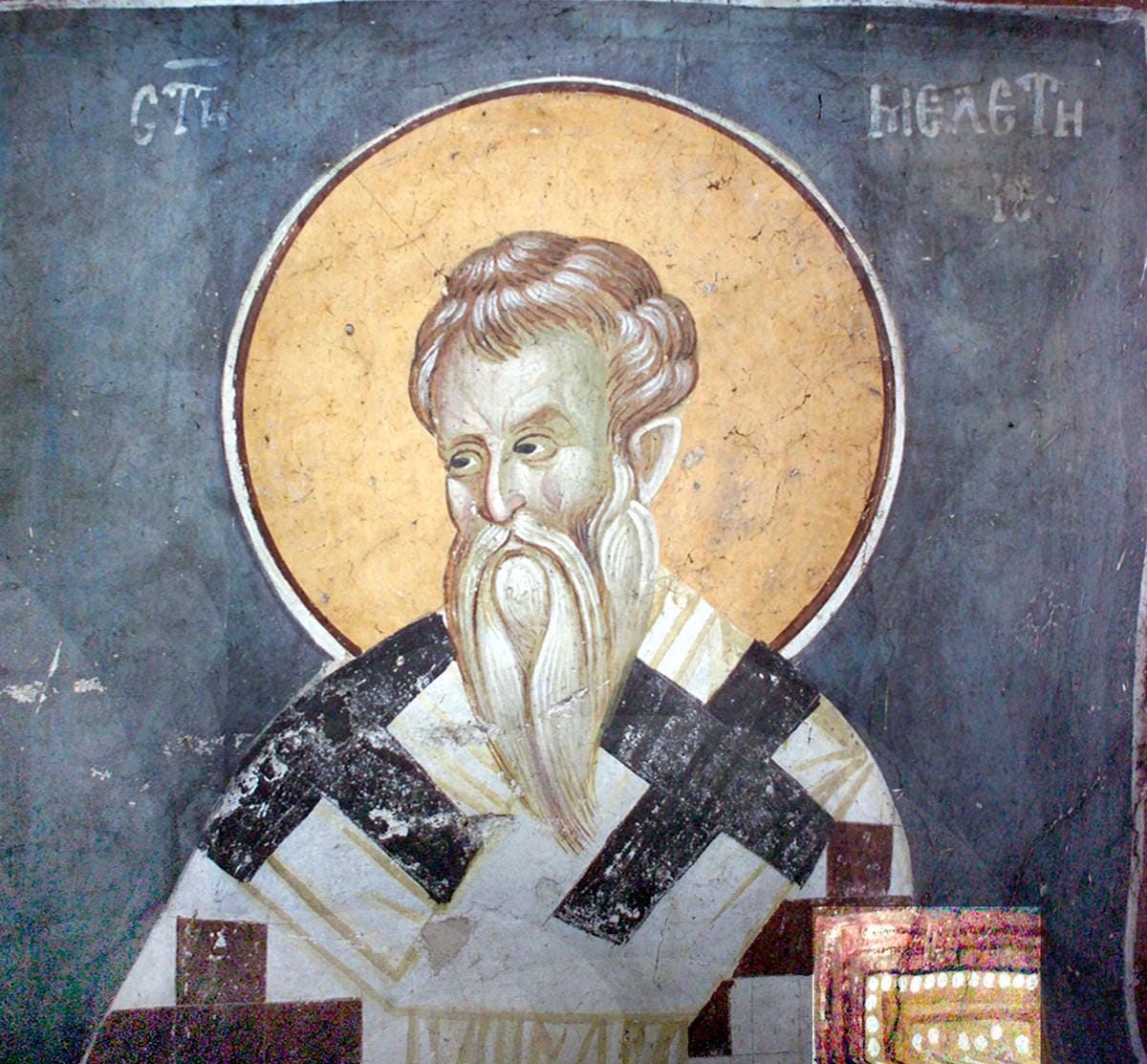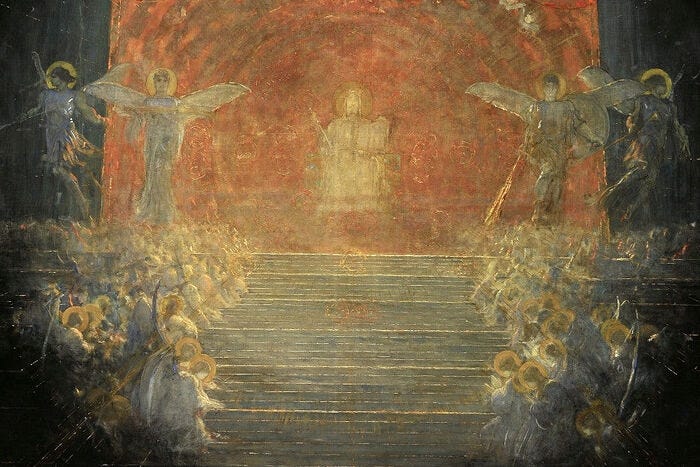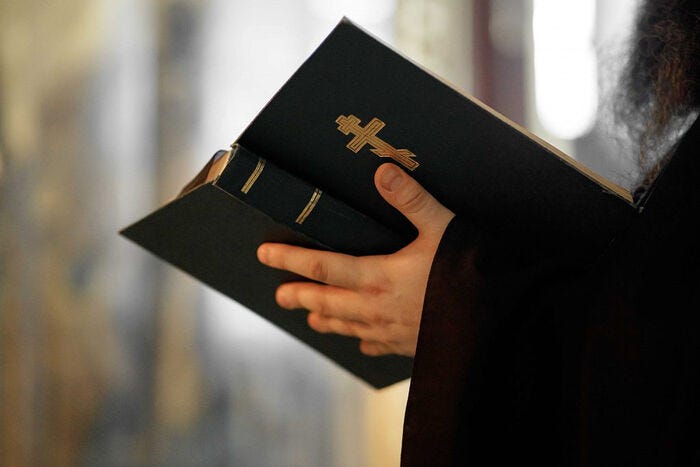“Who gives you the day will give you also the things necessary for the day.”
St. Gregory of Nyssa
2 Peter 3:1-18
Brethren, this is now the second letter that I have written to you, beloved, and in both of them I have aroused your sincere mind by way of reminder; that you should remember the predictions of the holy prophets and the commandment of the Lord and Savior through your apostles. First of all you must understand this, that scoffers will come in the last days with scoffing, following their own passions and saying, “Where is the promise of his coming? For ever since the fathers fell asleep, all things have continued as they were from the beginning of creation.” They deliberately ignore this fact, that by the word of God heavens existed long ago, and an earth formed out of water and by means of water, through which the world that then existed was deluged with water and perished. But by the same word the heavens and earth that now exist have been stored up for fire, being kept until the day of judgment and destruction of ungodly men. But do not ignore this one fact, beloved, that with the Lord one day is as a thousand years, and a thousand years as one day. The Lord is not slow about his promise as some count slowness, but is forbearing toward you, not wishing that any should perish, but that all should reach repentance. But the day of the Lord will come like a thief, and then the heavens will pass away with a loud noise, and the elements will be dissolved with fire, and the earth and the works that are upon it will be burned up. Since all these things are thus to be dissolved, what sort of persons ought you to be in lives of holiness and godliness, waiting for and hastening the coming of the day of God, because of which the heavens will be kindled and dissolved, and the elements will melt with fire! But according to his promise we wait for new heavens and a new earth in which righteousness dwells. Therefore, beloved, since you wait for these, be zealous to be found by him without spot or blemish, and at peace. And count the forbearance of our Lord as salvation. So also our beloved brother Paul wrote to you according to the wisdom given him, speaking of this as he does in all his letters. There are some things in them hard to understand, which the ignorant and unstable twist to their own destruction, as they do the other scriptures. You therefore, beloved, knowing this beforehand, beware lest you be carried away with the error of lawless men and lose your own stability. But grow in the grace and knowledge of our Lord and Savior Jesus Christ. To him be the glory both now and to the day of eternity. Amen.
Mark 13: 24-31
The Lord said: “But in those days, after that tribulation, the sun will be darkened, and the moon will not give its light, and the stars will be falling from heaven, and the powers in the heavens will be shaken. And then they will see the Son of man coming in clouds with great power and glory. And then he will send out the angels, and gather his elect from the four winds, from the ends of the earth to the ends of heaven. “From the fig tree learn its lesson: as soon as its branch becomes tender and puts forth its leaves, you know that summer is near. So also, when you see these things taking place, you know that he is near, at the very gates. Truly, I say to you, this generation will not pass away before all these things take place. Heaven and earth will pass away, but my words will not pass away.
Saint Meletius, Archbishop of Antioch
Saint Meletius, Archbishop of Antioch, was Bishop of Sebaste in Armenia (ca. 357), and afterwards he was summoned to Antioch by the emperor Constantius to help combat the Arian heresy, and was appointed to that See.
Saint Meletius struggled zealously against the Arian error, but through the intrigues of the heretics he was thrice deposed from his cathedra by the Emperor Constantius who had become surrounded by the Arians and had accepted their position. In all this Saint Meletius was distinguished by an extraordinary gentleness, and he constantly led his flock by the example of his own virtue and kindly disposition, supposing that the seeds of the true teaching sprout more readily on such soil.
Saint Meletius was the one who ordained the future hierarch Saint Basil the Great as deacon. Saint Meletius also baptized and encouraged another of the greatest luminaries of Orthodoxy, Saint John Chrysostom, who later eulogized his former archpastor.
After Constantius, the throne was occupied by Julian the Apostate, and the saint again was expelled, having to hide himself in secret places for his safety. Returning under the emperor Jovian in the year 363, Saint Meletius wrote his theological treatise, “Exposition of the Faith,” which facilitated the conversion of many of the Arians to Orthodoxy.
In the year 381, under the emperor Theodosius the Great (379-395), the Second Ecumenical Council was convened. In the year 380 the saint had set off on his way to the Second Ecumenical Council at Constantinople, and came to preside over it.
Before the start of the Council, Saint Meletius raised his hand displaying three fingers, and then withdrawing two fingers and leaving one extended he blessed the people, proclaiming: “We understand three hypostases, and we speak about a single nature.” With this declaration, a fire surrounded the saint like lightning. During the Council Saint Meletius fell asleep in the Lord. Saint Gregory of Nyssa honored the memory of the deceased with a eulogy.
Saint Meletius has left treatises on the consubstantiality of the Son of God with the Father, and a letter to the emperor Jovian concerning the Holy Trinity. The relics of Saint Meletius were transferred from Constantinople to Antioch.
Revelation: Removing the Veil
Metropolitan Athanasios of Limassol
Part 4
In matters of faith that are transmitted to us through the word of God, through Holy Scripture, we can be absolutely firm. God says it, the Gospel says it, Christ says it—we don’t discuss it. Thou shalt love the Lord thy God (Mk. 12:30)—it’s not me saying it, it’s God. I can be mistaken in my words; you can argue with me. I’m a human being, and it’s highly likely that I make mistakes. We all have to accept that we make mistakes—in ourselves and in others. Don’t be so surprised when someone makes mistakes. There’s nothing surprising about this. Human nature is imperfect, so it’s characteristic of it to make mistakes, sin, and have flaws.
True servants of God can be recognized by humility (the seal of truth is humility), by purity of heart. Then man accepts what God says, he receives Divine revelation with a pure and humble heart. God gave a revelation to Jesus Christ to show His servants what would happen soon. Someone might say: “So, all this is going to happen. And why do we need to know that this is going to happen? How are we to counter this? Tomorrow may come the day when they start giving people the seal of the antichrist, the number 666, and whoever doesn’t have this seal won’t be able to do anything—neither buy, nor sell, nor move, and so on. In any case, it’s going to start. And what are we supposed to do? Fight? Resist?”
All of this will happen, but we mustn’t bow our heads and be like a lamb to the slaughter (Is. 53:7); we shouldn’t accept all of this carelessly. We’re all responsible for ourselves. It’s important for us to keep our conscience, not to accept what isn’t good according to the teaching of the Holy Gospel, of Holy Scripture. The fact that this will inevitably happen doesn’t mean we have to just accept it all.
And it certainly doesn’t mean that those who take action are instruments in the hands of God, as, for example, in times of persecution. There were persecutions in the first centuries of the Church: Christians were persecuted, millions of people were tortured during the first three centuries. Nero killed thousands of Christians. But the fact that he destroyed so many Christians and Paradise was filled with saints doesn’t at all mean that Nero was an instrument of God’s providence and he’ll also go to Paradise. No. He was able to fill Paradise with martyrs, but he himself will go to hell for killing them. Those who do the works of satan, evil deeds, works that are not of God, are not justified by the fact that they serve for the salvation of others, participating in the providence of God.
Many people say about Judas: “What’s Judas to blame for? After all, it was foretold that Christ would be betrayed. He served God’s plan exactly. What’s this poor man guilty of?” But that’s not how it is. Judas didn’t do this because it was planned. It doesn’t mean this prophecy was recorded many years ago and therefore it must be fulfilled; rather it’s written because he betrayed. It was foretold. Prophecies are given because certain events will happen, but not the other way around; If there’s a prophecy, then it must come to pass. And those who contribute and commit what was foretold bear full responsibility for their actions. Those people who will destroy the universe tomorrow and bring this world to an end will be responsible for it. It can’t be said that they fulfilled God’s plan. You’re responsible for the crimes and the evil you commit. And prophets simply foresaw it.
I want you to understand this subtlety regarding the prophecies of God. God doesn’t determine what will happen; but rather, because it will happen, God foretells it to prevent people from following after it, and to protect them. Christ tried to stop Judas many times, as we know from the Gospel, so he wouldn’t commit this evil, but Judas wanted to do it. He’s responsible for this and for how he ended his life.
Thus, the words, which must shortly come to pass (Rev. 1:1) mean that this will happen, and thus it’s being written about. But those who will take part and commit this evil will bear full responsibility.
“Shortly”—what does that mean? Everything will happen in a day? We have to understand that God acts outside of time, and the events of Revelation don’t relate only to the end times. It describes events that had already happened when they were described by the holy Apostle John, and those that will happen later. The Church has always lived by the expectation of the resurrection from the dead, of the last day. We will read: Come, Lord Jesus! (Rev. 22:20). The Church lives by the expectation of the Coming of Christ, the expectation of the coming of the Kingdom of God. Thy Kingdom come (Lk. 11:2), we say in our prayers. We ask for the Kingdom of God both within our hearts and in general. Every person in the Church is waiting for the coming of the Kingdom of God. It’s not known when this will happen. And no matter how hard we try to figure out the deadlines, it won’t work—God will never tell us, because he doesn’t act out of human curiosity, but in a completely different way.
He signified it by His angel unto His servant John (Rev. 1:1). God showed all this to the servant of God John through an angel. John was a faithful servant of God—humble, pure, blameless, possessing everything necessary for a man to receive a Divine revelation. Who bare record of the word of God, and of the testimony of Jesus Christ, and of all things that he saw (Rev. 1:2). The Apostle and Evangelist John testified to what he saw, what he felt, what he experienced together with Christ and about the word of God.
And then he says: Blessed is he that readeth, and they that hear the words of this prophecy, and keep those things which are written therein: for the time is at hand (Rev. 1:3). That means Revelation was written for people to read it. Blessed is he that readeth. Blessed and happy are those who read and study the book of Revelation and Sacred Scripture, and those who listen to the teaching, the interpretation of the word of this prophecy. Therefore, there’s nothing bad about reading the words of prophecy. It’s enough that this is done correctly: in the spirit of humility and the teaching, according to the interpretations of the Holy Fathers of our Church, with the sole purpose of observing what’s written there. We shouldn’t read in order to satisfy our curiosity, like people who love to read horoscopes to know what they should do today and tomorrow. Some, often serious, people can’t live unless they read their horoscope. It’s interesting that different newspapers write different horoscopes and they don’t agree with each other, so you have to choose which one to read. Nonsense!
For the time is at hand. You might say: “Father, it’s been 2,000 years already and the end hasn’t come.” Indeed, it hasn’t come yet. There could be another 2,000 years and it doesn’t come. But, it’s absolutely certain that the end will come. In 5, 10, 100,000 years, it will come. There’s no doubt about it. You might not live till that time, but there will come the hour when you leave this world. Therefore, it’s important to read and keep what’s written in Revelation, not because you will necessarily personally witness that day. Some will live to see and meet the antichrist and see everything written there. But we, who probably won’t be alive in those times, must experience different events every day, recognizing those that are of the antichrist spirit, which come from breaking the commandments and from sins, from renouncing God. There are many events going on around us that challenge us and incite us to break the commandments of God.
When we come to the end of our lives, to our biological end, we’ll find ourselves before the face of everything we’ve done and thought. Our life, whether we want it to or not, unfortunately (or maybe fortunately) has its limit, its end. And one day it will come. Sometimes it comes early, sometimes later, but either way, it will come. For the time is at hand. One can argue that we won’t live to see the antichrist, but the hour of our departure from this world will come, when we will stand before God and see what we have done and not done. We mustn’t live in fear and oppression. Revelation and the Gospel weren’t written to intimidate us or force us to believe in God out of fear. It’s wrong to believe in God because you’re afraid. They were written so we would love God, believe in Him for real, with love; because we see there how God loves the world, that He has prepared for us to live with Him in eternity. God calls us to the Eternal Kingdom and to the eternal coming of His love.
This week’s calendar reminders:
Monday 2/10: Matins 8:30 am; Stewards Meeting 6:30 pm
Tuesday 2/11: no services or events
Wednesday 2/12: no services or events
Thursday 2/13: Matins 8:30 am
Friday 2/14: Matins 8:30 am
Saturday 2/15: Catechumen Class 4:30 pm; Choir Practice 5 pm; Great Vespers 6 pm
Sunday 2/16: Divine Liturgy 9:15am
CLICK BELOW to donate online:
Christ the Savior Orthodox Church is located in Southbury, Connecticut, and is part of the New England Diocese of the Orthodox Church of America.
Mailing address: Christ the Savior Church, 1070 Roxbury Road, Southbury, CT 06488
PLEASE DONATE to help our parish do the work of the Lord, thrive and grow, and extend the Kingdom of God. May the Lord bless your generosity!
Fr. Moses Locke can be reached at frmoseslocke@gmail.com












